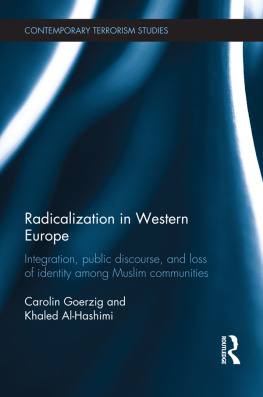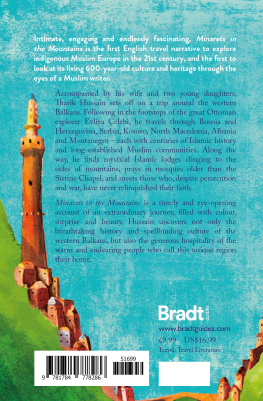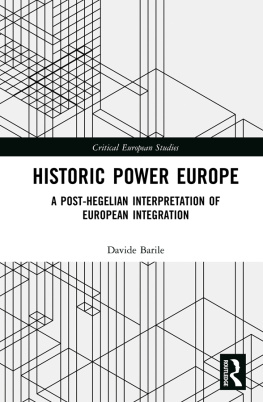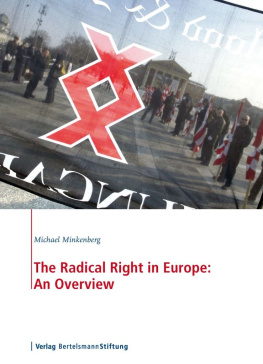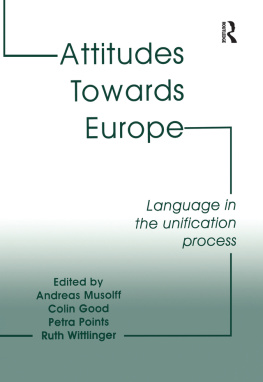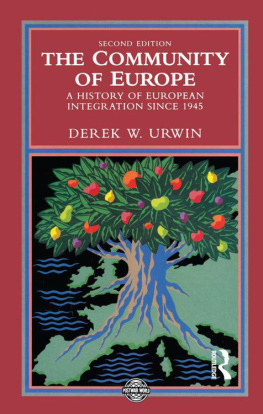Radicalization in Western Europe
Employing a theoretical framework based on the concept of identity loss, this book seeks to understand why increased integration has stimulated greater radicalization among the Muslim populations in Western Europe.
Through extensive field research in four European countries the UK, the Netherlands, Germany, and France the authors investigate three key questions: (1) Why are second and third generations of Muslims in Europe more radical than their parents?; (2) Why does Europe experience more home-grown terrorism today than 30 or 40 years ago?; (3) Why do some European countries feature more radical Muslim communities than others? The book reveals that these three puzzling questions can be solved when analyzing the loss of individuality in the face of integration and identification with European society.
While individualist and structural approaches fail to explain radicalization of Muslims in Europe, this study, by framing radicalization through coupling the public discourse with identity loss, provides a much needed insight into the process of radicalization. Explaining radicalization and gaining an understanding of the drivers of radicalization is crucial to prevent and mitigate intercultural alienation, to further develop immigration policies, redress integration failures as well as to avoid dangerous oversimplifications. This book contributes not only to understanding why greater integration is matched by increasing radicalization, but its insights also contribute to developing ideas about how radicalization can be prevented or overcome and integration policies can be enhanced.
This book will be of much interest to students of terrorism and counterterrorism, radical Islam, war and conflict studies, European politics, IR, and security studies.
Carolin Goerzig is Assistant Professor in the L. Douglas Wilder School of Government and Public Affairs at the Virginia Commonwealth University, USA. She is author of Talking to Terrorists (Routledge 2010).
Khaled Al-Hashimi works for Mdecins Sans Frontires in conflict and violence prone regions of Africa and the Middle East.
Contemporary Terrorism Studies
Understanding Terrorist Innovation
Technology, tactics and global trends
Adam Dolnik
The Strategy of Terrorism
How it works, why it fails
Peter Neumann and M.L.R. Smith
Female Terrorism and Militancy
Agency, utility, and organization
Edited by Cindy D. Ness
Women and Terrorism
Female activity in domestic and international terror groups
Margaret Gonzalez-Perez
The Psychology of Strategic Terrorism
Public and government responses to attack
Ben Sheppard
The De-Radicalization of Jihadists
Transforming armed Islamist movements
Omar Ashour
Targeting Terrorist Financing
International cooperation and new regimes
Arabinda Acharya
Managing Terrorism and Insurgency
Regeneration, recruitment and attrition
Cameron I. Crouch
Religion and Political Violence
Sacred protest in the modern world
Jennifer L. Jefferis
International Terrorism Post-9/11
Comparative dynamics and responses
Edited by Asaf Siniver
Talking to Terrorists
Concessions and the renunciation of violence
Carolin Goerzig
Freedom and Terror
Reason and unreason in politics
Abraham Kaplan and Gabriel Weimann
Evaluating Counterterrorism Performance
A comparative study
Beatrice de Graaf
The EU and Counter-Terrorism
Politics, polity and policies after 9/11
Javier Argomaniz
The Evolution of EU Counter-Terrorism
European security policy after 9/11
Raphael Bossong
Conducting Terrorism Field Research
A guide
Edited by Adam Dolnik
USUK Counter-Terrorism after 9/11
A qualitative approach
Edgar B. Tembo
Transforming Violent Political Movements
Rebels today, what tomorrow?
Kevin Grisham
Radicalization in Western Europe
Integration, public discourse, and loss of identity among Muslim communities
Carolin Goerzig and Khaled Al-Hashimi
First published 2015
by Routledge
2 Park Square, Milton Park, Abingdon, Oxon OX14 4RN
and by Routledge
711 Third Avenue, New York, NY 10017
Routledge is an imprint of the Taylor & Francis Group, an informa business
2015 Carolin Goerzig and Khaled Al-Hashimi
The right of Carolin Goerzig and Khaled Al-Hashimi to be identified as authors of this work has been asserted by them in accordance with sections 77 and 78 of the Copyright, Designs and Patents Act 1988.
All rights reserved. No part of this book may be reprinted or reproduced or utilized in any form or by any electronic, mechanical, or other means, now known or hereafter invented, including photocopying and recording, or in any information storage or retrieval system, without permission in writing from the publishers.
Trademark notice: Product or corporate names may be trademarks or registered trademarks, and are used only for identification and explanation without intent to infringe.
British Library Cataloguing-in-Publication Data
A catalogue record for this book is available from the British Library
Library of Congress Cataloging-in-Publication Data
A catalog record for this book has been requested
ISBN: 978-0-415-73446-2 (hbk)
ISBN: 978-1-315-81711-8 (ebk)
Typeset in Times New Roman
by Wearset Ltd, Boldon, Tyne and Wear

